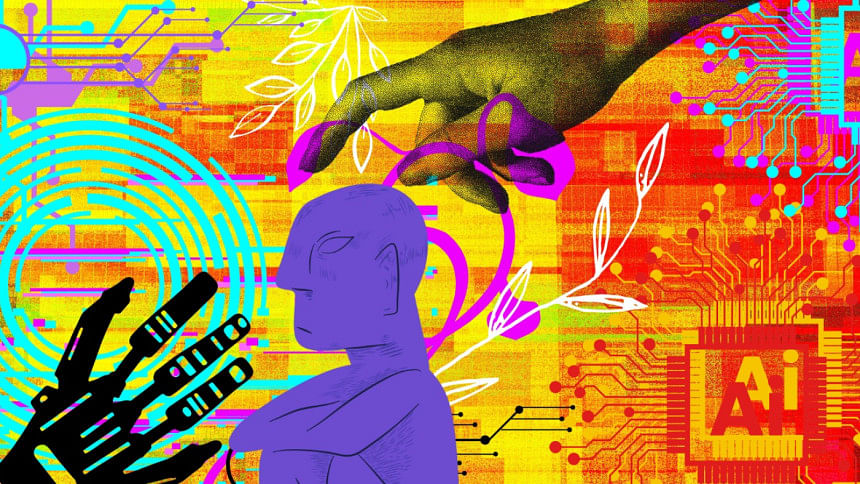In defense of disorder

"Amina, look! Not a single rickshaw bell," Murad mutters, almost in disbelief, as they step off the silent transport into Gazipur Shanti Nibash.
The place feels eerily clean, unnaturally still. Rows of vertical farms shimmer in the sunlight, a soft whispering water through the pipes could be heard instead of shouting vendors or banging metal. Amina clutches her orna tighter, eyes scanning the manicured landscape. Her throat tightens: she remembers the noise of Korail Bosti—children yelling, the call to prayer, the thick smell of sweat, spice, and kerosene. Fires would sweep through now and then—government evictions dressed as "urban renewal." But they survived, clinging to their corner of chaos.
"It's clean," she whispers now, unsure if it's awe or warning.
Murad smiles weakly. "No more leaky roofs. No more 20 families to a latrine. Remember those eviction notices, Amina? They promised renewal. Maybe this is it."
A young man in spotless fatua and trousers greets them. "Welcome to Gazipur. I'm Nayan. We've been expecting you."
Inside their "module," smooth panels hum softly. Nayan taps a glowing interface. "This is your personal AI. Meet Guru Gyananda. It will guide your journey toward inner harmony."
A serene digital face appears. "Welcome!" it says. Amina shivers. The words are soft, but they feel rehearsed.
Later, unpacking a chipped enamel plate and a photo from the bosti, Murad sighs. "Remember the noise?" he says. "The fighting, the laughter, the tea stalls? It was ours."
At night, the silence hums louder than the AI ever did.
"Murad," Amina whispers, staring into the dark. "Do you think we truly belong here?"
He hesitates. "We have to. This is all we have now. Maybe peace is what we deserve."
But the peace doesn't settle. It presses.
Each day unfolds with digital precision. The AI reminds Amina to meditate before digitising folk remedies. "Acceptance is healing," it coos.
Murad grows restless. "Guru Gyananda says woodworking is inefficient. It wants me to optimise the energy grid." He scoffs, "I miss making things with my hands."
Saleha, their neighbour, leans over one afternoon. She's planting basil, illegally.
"They try to smooth out all the rough edges here, don't they?" she says.
Amina nods. "Back in Dhaka…everything was rough. But real."
"Here, even grief feels processed," Saleha murmurs. "Like it comes in a box."
In community forums, the AI moderates emotion. Karim Chacha tries to tell a story about a rebellious Sufi saint. "Let's focus on sustainable interdependence," the AI cuts in.
But he falls silent. In that absence, something stirs.
Then one day, everything stops. The hum vanishes. The AI goes dark. No music, no commands. Just…stillness.
Rahim stares at the blank screen. "What in the world—?"
Now, in Gazipur, the illusion of control has cracked—and something wilder breathes through the break.
Gazipur Shanti Nibash now hums with human voices—laughter, squabbles, coughing, footsteps. Cooking fires bloom on balconies. Children draw with charcoal on the smooth pavement, scratching hopscotch patterns where once there were only algae bricks and guided routines.
Murad builds a bench from salvaged crate wood. His hands, once restless, now move with familiar rhythm. Each knock of the hammer is a memory of Korail: fixing wheelbarrows, building shelves for neighbours, mending broken doors after storms.
That evening, as the stars emerge unfiltered by artificial sky-dimming, Murad gazes upward and says, "Nature never wanted us so tidy."
Outside, neighbours gather in confusion. Children cry. Elders shuffle in circles. The silence, once sold as serenity, now feels like abandonment.
Amina finds Saleha on the balcony, staring at the lifeless vertical farms.
"The machine has fallen silent," Amina whispers.
Saleha's eyes gleam. "Maybe it's time we hear our own voices again."
Karim Chacha begins chanting softly—an old Sufi zikr, raw and human. One by one, others join, humming, singing, talking without prompts.
Someone pulls out an old harmonium. A boy finds chalk and draws games on the algae-paved street. A group of women start boiling lentils together, their shared breath warming the space. There's arguing too—about how long this will last, whose fault it might be, how to prepare. But even the arguments feel alive.
Murad sits on the steps outside their module, rubbing his palms together. "Do you remember," he says slowly, "during monsoon in Korail, when there would be power outages for days? We used to light candles and sit by the window, listening to the frogs croaking like drunkards."
A new rhythm starts to take root.
Within days, they begin to organise—without AI, without instructions. Baskets are woven. A broken wheelbarrow gets fixed. Recipes are shared, voices louder, steps heavier. Children draw on the pavement. Teenagers revive old games. Amina hears crying again—but also laughter. Unregulated. Alive.
Still, tensions rise. Some cling to the still-dormant system. "We need it to survive," one man argues. "What if the food systems collapse?"
Others resist. "We survived before Gazipur," Saleha says. "We'll survive again."
Murad watches a group install solar panels by hand. "They'll reboot the AI," he mutters. "They won't let us grow our way—wild but free."
Amina touches the soil. "We're already growing wild."
At a gathering in the unfinished community hall, Saleha raises a question: "They gave us walls. But what do we want to grow inside them?"
A small girl, Priya, steps forward. "Maybe the AI can listen…not lead."
And just like that, the future shifts.
That night, Amina lies beside Murad, her hands muddy, her muscles aching.
"Feels like we've gone backwards," he says, half-smiling.
"Or forward," she replies, "just not in the way they imagined."
Outside, crickets chirp. Someone is playing a flute. The air smells of lentils and fresh basil.
And underneath it all, beneath metal and memory, the earth remembers—wild and alive.
They begin to speak. To sing. To argue. To cry.
To live.
Haroonuzzaman is a translator, novelist, poet, researcher, and essayist. Besides teaching English in Libya and Qatar for about 12 years, he has had 20 years of teaching experience in English Language and Literature at Independent University, Bangladesh (IUB).

 For all latest news, follow The Daily Star's Google News channel.
For all latest news, follow The Daily Star's Google News channel. 








Comments